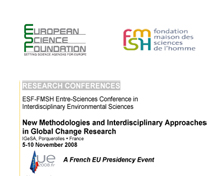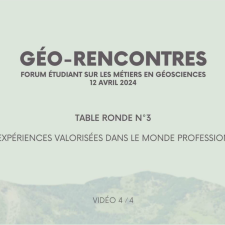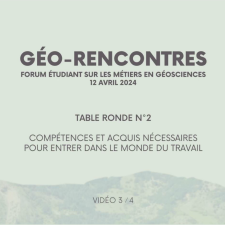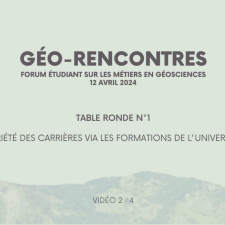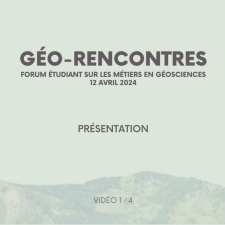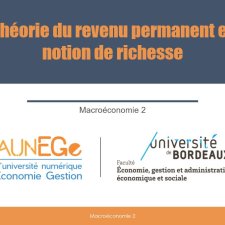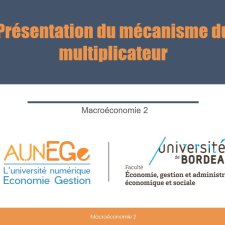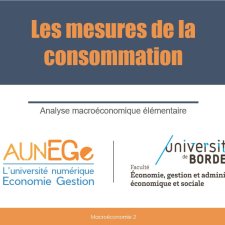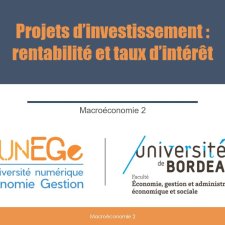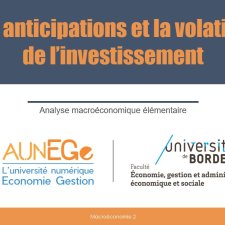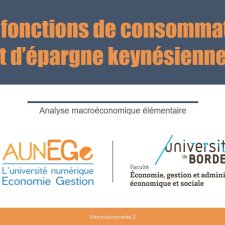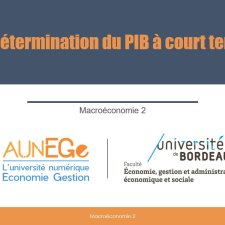Notice
Debate
- document 1 document 2 document 3
- niveau 1 niveau 2 niveau 3
Descriptif
The European Science Foundation (ESF) and the French Foundation of the Maison des Sciences de l’Homme (FMSH) (within the Entre-Sciences programme) have agreed to jointly develop a new conference series in environmental sciences; an effort to actively foster exchanges between scientists working in the humanities and social sciences and their colleagues in the life and natural sciences.
This interdisciplinary conference present the new advances in the modelling of the Global Change that combines Geosciences and Economics, with a perspective view from history - given the novelty of their interrelations – and from political science – given the impact of the model outputs in the public sphere. The conference gather together speakers and attendees from Europe, United States and Asia.
The conference focuses on new advances in the construction of models of the global change, in Earth sciences and in Economics. Given the issues at stake with Global Warning in terms of impacts and risks, these multidisciplinary approaches are necessarily placed in a public policy perspective, a case apparently unique in the history of science. Chaired by Joël Guiot, climatologist at the European Centre for the Research and Teaching of the Geosciences of the Environment (CEREGE, Aix-en-Provence) and Sylvie Thoron, economist at the Aix-Marseille Research Group in Quantitative Economy (GREQAM, Marseille), the conference aims at generating intense discussions between scientists coming from various disciplinary horizons, by emphasizing the need for integrative approaches when thinking of our future in terms of sustainable development.
>> More information on the web site site web Entre-Sciences Programme.
Intervention / Responsable scientifique
Dans la même collection
-
Global Climate Change: Past and Future
MannMichael E.My presentation will begin with a review of the now-solid evidence for a human influence on the climate of recent decades. Such evidence includes instrumental measurements available for the past two
-
Modelling Forced and Internal Climate Variability During the Last Millennium
GoosseHughesAt hemispheric scale, the surface temperature is strongly influenced by the 28 variations of the natural (solar and volcanic) and anthropogenic (land-use, sulphate aerosols, greenhouse gas
-
A Roadmap to Assess the Economic Cost of Climate Change with an Application to Hurricanes in the Un…
HallegatteStéphaneThis talk presents a methodological roadmap to assess macro-economic damages from climate change. To do so, it explores a single manifestation of climate change in a single location: an increase in
-
Industrial and Environmental Policies: Reciprocal Impacts
ChauvinDominiqueTotal as a key player of the Oil and Gas industry is providing answers to 25 environmental challenges. In that respect, it has already developed environmental objectives and policies. Its
-
The Intergovernmental Panel on Climate Change and the Challenges of Climate policy, Equity and Ethi…
SomervilleRichardThe 2007 Intergovernmental Panel on Climate Change (IPCC) report provides clear guidance for the greenhouse gas emissions reductions needed to limit global warming to specific targets such as 2 °C
-
The Costs of Strategic Adaptation in a Simple Conceptual of Climate Change
MillnerAntonyA simple theoretical model of the process of strategic adaptation to climate change is proposed. Climate change is represented by a non-stationary Markov process on the space of climate states, and
-
Holocene Climatic Changes and Their Effect on Morphodynamics and Sedimentation in Campania
AmatoVincenzoHigh-resolution paleoclimatic studies (e.g. 18O, 13C, CH4, MS, ect) provide 38 detailed reconstructions of the Holocene climatic variability, but they don’t are unable to provide direct informations
-
Debate
JoussaumeSylviePlantonSergeGonzales RoucoJesus FelipeGoosseHughesReissellAnniBrasseurGuyThe European Science Foundation (ESF) and the French Foundation of the Maison des Sciences de l’Homme (FMSH) (within the Entre-Sciences programme) have agreed to jointly develop a new conference
-
Linking Adaptation and Mitigation for Climate Risk Reduction
ShogrenJason F.How people privately and collectively adapt to climate risk can affect the costs and benefits of public mitigation policy (e.g., Kyoto); an obvious point often neglected in actual policy making.
-
The Effect of Thermal Pollution on Benthic Foraminiferal Assemblages, in the Mediterranean Shore Fa…
ArieliRuthieOver the past several decades public and scientific awareness to global warming has increased significantly. As a result, many studies have examined the affects of global warming. However, the
-
International Negociations on Climate Change: How to Take Advantage of Risk Aversion to Improve the…
ThoronSylvieClimate change is one of the best examples of global environmental problems. Countries are conscious that they have to find a solution to this global problem at the international level. Negotiations
-
IPCC Working Group I
SomervilleRichardThe European Science Foundation (ESF) and the French Foundation of the Maison des Sciences de l’Homme (FMSH) (within the Entre-Sciences programme) have agreed to jointly develop a new conference
Avec les mêmes intervenants et intervenantes
-
Industrial and Environmental Policies: Reciprocal Impacts
ChauvinDominiqueTotal as a key player of the Oil and Gas industry is providing answers to 25 environmental challenges. In that respect, it has already developed environmental objectives and policies. Its
-
Recent Trends and Vulnerabilities in the Carbon Cycle
CiaisPhilippeWe shall address the coupling between atmospheric circulation and the modelling of ecosystems, to have a better understanding of the carbon cycle, perturbed both by land use and Climate Change. The
-
The Impacts of Climate Change on Continental Ecosystems
SeguinBernardClimate change will deeply modify the ecophysiological functioningof plants, by creating a set of conditions which could be more favourable (in the sense of biomass production) or not. Among the first
Sur le même thème
-
Géo-Rencontres 2024 / Les expériences valorisées dans le monde professionnel
LilloEmmaAraujoJulieHuartFlorianDubreuRomainBuquetDamienChazalLauraBorieMarianeForum sur les métiers en géosciences organisé par les étudiants du CMI Ingénierie Géologique et Civile, Université de Bordeaux, 12 avril 2024
-
Géo-Rencontres 2024 / Compétences et acquis nécessaires pour entrer dans le monde du travail
BrinonJulietteAmoleFili-FenuaPretouFrédéricCampetHugoLiébauxAlbinDe AlemeidaMarie-LouPoirierAymericDufrenoyAudreyForum sur les métiers en géosciences organisé par les étudiants du CMI Ingénierie Géologique et Civile, Université de Bordeaux, 12 avril 2024
-
Géo-Rencontres 2024 / Variété des carrières via les formations de l'université
InguimbertDianeLacazeRomaneLemaitreLaurieChazalLauraMontjeanPascalPoudevigneJacquesPortefaixFrédéricForum sur les métiers en géosciences organisé par les étudiants du CMI Ingénierie Géologique et Civile, Université de Bordeaux, 12 avril 2024
-
Géo-Rencontres 2024 / Présentation
LatasteJean-FrançoisLavieThéoForum sur les métiers en géosciences organisé par les étudiants du CMI Ingénierie Géologique et Civile, Université de Bordeaux, 12 avril 2024
-
Tokyo, plus grande « ville » au monde : aménager et gouverner la démesure
Languillon-AusselRaphaëlAvec ses quelques trente-cinq millions d’habitants, Tokyo est la « ville » la plus peuplée au monde, et l’une des métropoles les plus riches. Cette présentation vise à décrire, analyser et expliquer,
-
La théorie du revenu permanent et la notion de richesse
Maveyraud-TricoireSamuelLa théorie du revenu permanent et la notion de richesse
-
Présentation du mécanisme du multiplicateur
Maveyraud-TricoireSamuelPrésentation du mécanisme du multiplicateur
-
-
Projet d'investissement : rentabilité et taux d'intérêt
Maveyraud-TricoireSamuelProjet d'investissement : rentabilité et taux d'intérêt
-
Les anticipations et la volatilité de l'investissement
Maveyraud-TricoireSamuelles anticipations et la volatilité de l'investissement
-
Les fonctions de consommation et d’épargne keynésiennes
Maveyraud-TricoireSamuelLes fonctions de consommation et d’épargne keynésiennes
-
La détermination du PIB à court terme
Maveyraud-TricoireSamuelLa détermination du PIB à court terme


